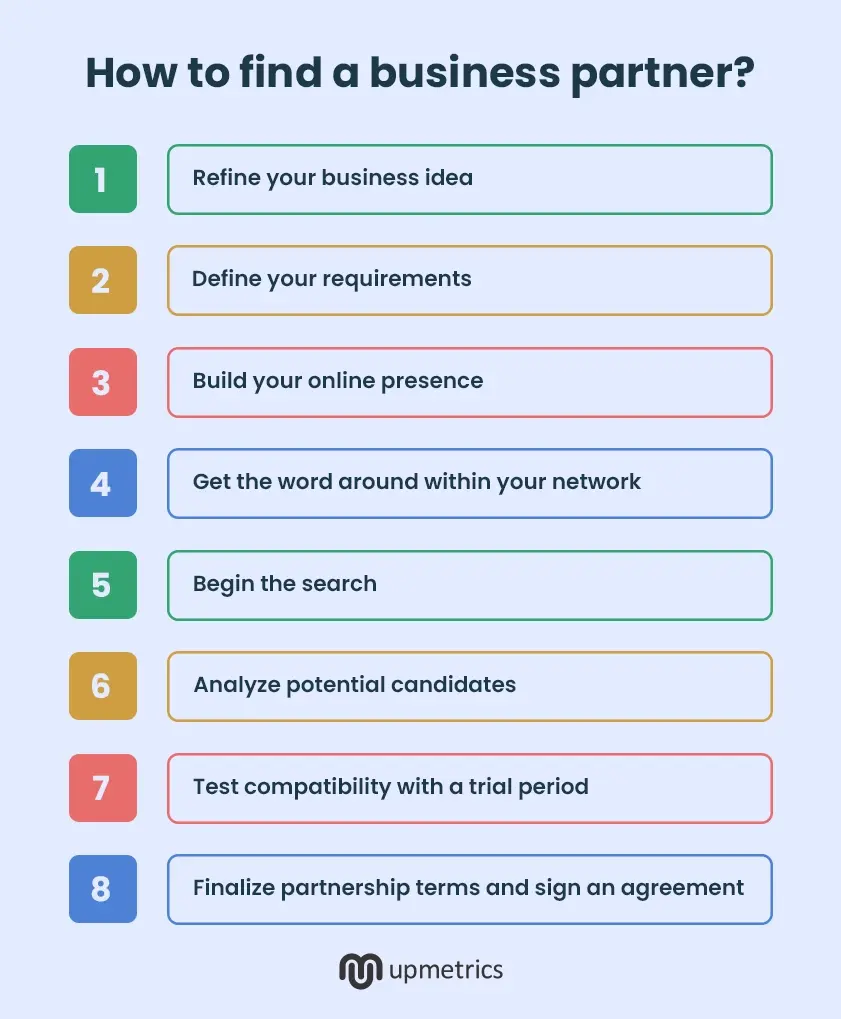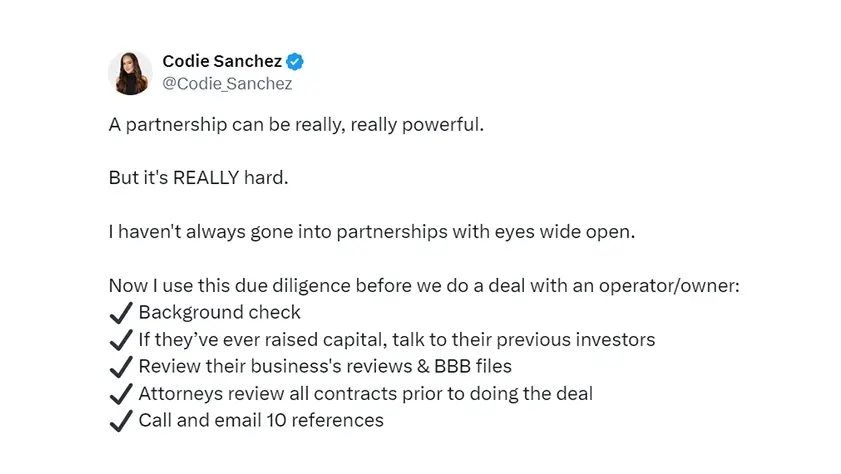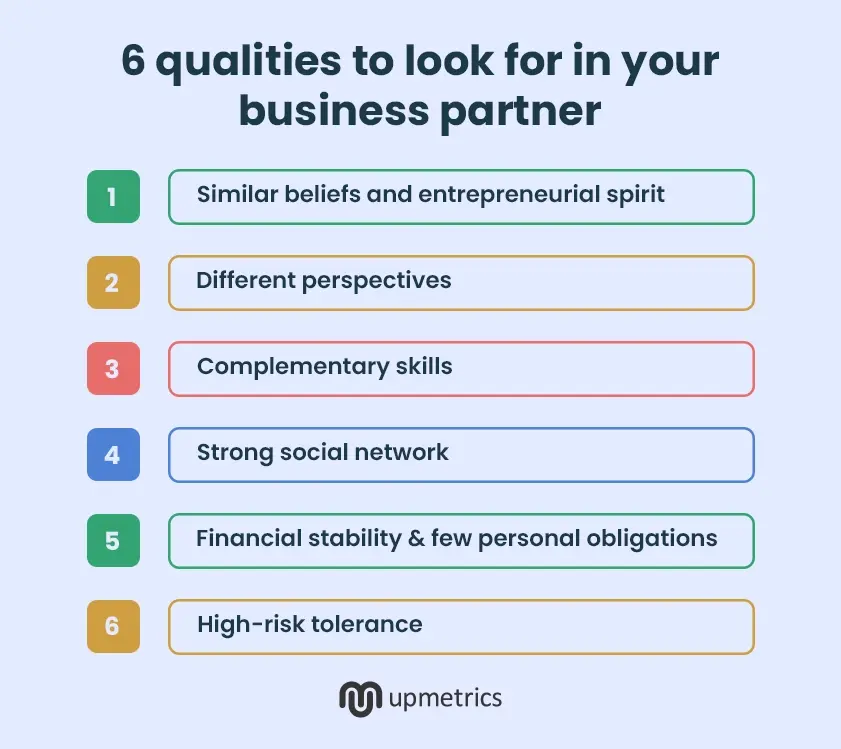It’s not an easy feat to turn an idea into a business. Although being a solopreneur sounds exciting, it can quickly become overwhelming. You can only ride solo to start your venture. However, teaming up with a business partner will become necessary to ensure continued success.
The right partner will nurture your business and share your workload. However, it can be challenging to find someone whose personal ethos aligns with yours.
In this blog post, let’s uncover a step-by-step guide to finding a business partner and the qualities you should be looking for in them. However, before that…
Why do you need a business partner?
Every entrepreneur needs help to push their business ideas towards launch. Even as you grow, you would need people to share the load.
But why exactly do you need a partner? Can’t you possibly do with hiring a freelancer or a specialist? After all, getting a partner on board would mean sharing profits with them.
Well, there’s no right or wrong reason why an entrepreneur would chase a partnership. However, here are a few reasons that may indicate the need for a business partner.
- The increasing workload and high-level responsibilities.
- Lack of quintessential skills to run or grow the business.
- Capital needs to ease the financial burden.
- Visionary and action-oriented person to execute your ideas.
- Complementary skills to skyrocket your business
Evaluate if a business partnership is actually essential. If so, follow these steps to find yourself a business partner.
How to find a business partner?
Every entrepreneur has unique preferences for a business partner based on their vision, personal values, and company requirements. But the process of finding one is similar. Here are the eight steps you should follow while looking for a business partner.

1. Refine your business idea
Before looking for a business partner, make sure that your business idea is attractive enough for someone to hop on board. To do that, it’s a good idea to refine your business plan once in a while to conform to new market trends.
Conversely, if you’re looking for a partner who will help you do all this, it’s imperative to make it clear to the potential candidates. Regardless, it’s important to have at least a one-page business plan to present to your potential business partners.
2. Define your requirements
Once you have a solid outline of your business idea, you move on to listing down your preferences for your business partner. Here, there are two things to consider:
Compatibility with your business
Depending on your business idea, your requirements change. For instance, if you plan on starting a SaaS company, you need a partner who has adequate knowledge in that particular field. Further, your requirements also depend on the stage where your company is. If you’re an established company, you would be looking for a partner who has enough experience in the industry rather than a young entrepreneur.
Compatibility with you
It’s ideal to have some similarities and differences between you and your partner to make for you a balanced team. Simply put, your partner should complement your strengths and offset your weaknesses.
“Fight for the things that you care about, but do it in a way that will lead others to join you.” – Ruth Bader Ginsburg
3. Build your online presence
Just as keen as you are to know everything about your business partner, they would be too. This is why you need to have a credible online presence for your potential business partners to learn about.
You can build your online presence via a dedicated website and by remaining active on platforms like LinkedIn, Instagram, Twitter, etc. While building an online presence is a great way to get discovered, LinkedIn outreach can help you expand your network and connect with potential business partners.
4. Get the word around within your network
One of the easiest ways to attract potential candidates is by letting your online and offline network know that you’re looking for a business partner. You can use your contacts to get referrals to connect and converse with interested candidates.
On top of that, talking to your fellow entrepreneurs helps you know how they found their business partners. By talking to multiple people, you can create a knowledge pool and choose ways that you think can work the best for you.
5. Begin the search
Once you have a business plan, a solid online presence, and have put the word out in your circles, you can start looking for a business partner at these places:
- Within your industry: You can find like-minded people in business conferences, entrepreneurial communities, workshops, courses, etc. Whenever you’re a part of them, always be on the lookout for capable candidates.
- Colleagues: Choosing a partner from your coworkers can be a great idea. As you have experience working with them in the past, you can be sure that you will get along well.
- Online: Search within your network, hire headhunters, scan recruitment portals, do cold outreach, etc.
- Friends and family: You can find a business partner within your friends and family circle too. Although the partnership dynamics may affect your relationship and vice-versa, this is also an option to consider.
Regardless of where you search, make sure to keep in mind all the requirements you have jotted down in step two.
6. Analyze potential candidates
Once you’ve identified a few potential business partners, inquire about them as much as possible. This will help you verify their identity, their credibility, understand their expertise in your industry, and review their work history.
If you think someone is competent enough, set up an interview to get to know them as a person. Having multiple conversations with your potential partner can help you understand their values and beliefs, and their overall outlook toward business and life in general.
Remember that partnerships are easy to get into but very hard to get out of. As Codie Sanchez, the founding member at the Contrarian Thinking Capital says, create a due diligence checklist before building a partnership with anyone.

7. Test compatibility with a trial period
After the interviews, if you have found someone who fits your needs, set up a trial period. While things might look all fine and dandy on paper, anything can go wrong in reality. Hence, this step is crucial to ensure your partnership will stand the test of time.
A trial period will help you:
- Understand the dynamics of the relationship
- Review their skills and expertise in person
- Evaluate the value they add to your business
- Avoid the risk of choosing the wrong partner
8. Finalize partnership terms and sign an agreement
After the trial period, if you feel the partnership is beneficial and sustainable for you and your company, you can seal the deal by signing the partnership agreement. While contract management is often overlooked by entrepreneurs, it ensures that all contract terms are adhered to and that any modifications or updates are handled correctly.
Your partnership agreement should include the following:
- Name of the partnership
- Term of the partnership
- Purpose of the partnership
- Roles and responsibilities
- Percentage of ownership
- Division of profit and loss
- Decision-making power
- Conflict resolution
- Exit strategies
6 qualities to look for in your business partner
A business partnership is often compared to a marriage, and rightly so. This is because in both cases, the parties involved function as a team, their actions affect the other person, and their finances are interdependent.
Therefore, it’s crucial to find a partner who is a good fit for your personality and vision. While choosing a partner, look for the following qualities:

1. Similar beliefs and entrepreneurial spirit
Having a partner who understands your beliefs and your way of doing business is paramount. If you and your partner are not on the same page, it can be challenging to make decisions. This can create instability in management and hinder your company’s growth.
2. Different perspectives
While having a similar vision is vital, it’s necessary to have contrasting perspectives in a partnership. If you and your partner always agree on everything, there might be a chance you’re overlooking alternate ways of approaching a problem.
Find someone who understands your methods but also suggests better options when appropriate to help you look at things in a different light. This will broaden your opportunities and increase your chances of success.
3. Complementary skills
Entrepreneurs often have expertise in multiple skills. However, it’s unlikely that a person could know everything a company needs. Hence, it’s essential to choose a partner who has the skills you lack.
For instance, if you’re an expert in marketing and finances but struggle with interpersonal skills, find a partner who can compensate for that deficit.
4. Strong social network
Choosing a partner who has a strong personal brand and is a part of multiple social circles can help your business get more exposure. It can also increase your client base, strengthen your company’s brand, and make it more likely to get funding from investors.
5. Financial stability and few personal obligations
It’s crucial to consider how your partner’s personal life will affect you and your business. If they have a bad relationship with money and are in debt, they can’t fully contribute to the partnership and may prove to be a burden. Remember, someone with a poor credit score is not an ideal candidate.
If you’re seeking funding, know that investors look at your personal credit score to determine whether you’ll pay off the debts. If you or your partner has a bad credit score, your investment request will be rejected.
6. High-risk tolerance
Taking a risk is inherent for any business, more so if you’re a startup. Often in businesses, you need to make bold decisions even when a positive outcome is not obvious. If your partner is reluctant to make such decisions, you might lose potential opportunities.
Choose the right business partner to grow your business
It’s far too common for an entrepreneur to have too much on their plate, and it can be discouraging at times to keep going. A good partner could reduce the burden and help you get through difficult times.
However exciting this process might be, don’t rush into it. Take your time to interview potential partners, verify their identity, and set up a trial period before finalizing a partnership deal.
Now, a well-drafted business plan can help you significantly in capturing the attention of significant potential partners. When you approach them with a business plan, it shows your commitment and sincerity towards a business.
So quickly whip up a business plan with the Upmetrics business planning app and build significant partnerships to grow your business.

